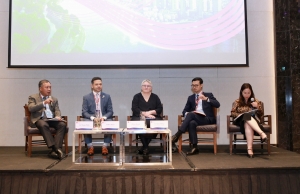Growing AI applications now prevalent in healthcare
 |
| Growing AI applications now prevalent in healthcare, illustration photo/ Source: freepik.com |
According to the Centre for Science and Technology Information of Ho Chi Minh City, there are many applications of AI in the healthcare sector. Specifically, in diagnosis and treatment of diseases, there have been more than 2,600 AI applications thus far. In models for monitoring, simulation, and forecast of diseases and epidemics, the number has reached more than 1,000.
For screening and testing, and research and development of drugs and vaccines, there have been over 250 and 68 AI applications.
However, the number of AI applications in diagnosing certain diseases and epidemics in Vietnam is not as high compared to other country’s across the globe. The highest figure is in diagnosis of cancer, hitting over 1,000 cases. The runners-up are heart diseases with 427 cases, lung diseases 138, and coronavirus with 93.
Researchers and clinicians now care about whether AI can help optimise the diagnosis and treatment process and increase patients’ survival time.
There are current limitations in Vietnam, mainly coming from late diagnosis, lack of human resources and modern equipment, and resistance to standard treatment. Meanwhile, the world’s newest treatment trend is the widespread application of AI.
AI applications diagnosing cancer has increased. This is because AI can accurately identify and analyse results such as gene sequencing results and histopathology. Moreover, it can quickly process and analyse large amounts of information with guaranteed high performance. It also can assist doctors in diagnosis and individualise treatment to help improve accuracy.
Cancer is increasing in Vietnam. In 2022, the country saw more than 180,000 new cases and over 120,000 deaths. And now about 354,000 people are living with cancer. Breast cancer tops the list, followed by lung cancer and liver cancer.
The process of developing an AI model to support cancer treatment is based on available clinical data, and it is possible to train AI models for purposes related to cancer treatment. AI can be applied in neoadjuvant therapy, chemotherapy, immunotherapy, targeted therapy, and surgery.
Among these fields, there is huge potential for developing AI applications in the treatment of cancer diseases. They include analysing and making predictions about treatment prognosis and risk of treatment resistance, shortening treatment planning time, and optimising modern treatment methods.
For instance, applying AI in usage of drugs has many uses. Deep learning algorithms are used to analyse and provide potential suggestions in cancer treatment, related to the current drugs available
AI predicts the treatment response of targeted therapy. Machine learning models are used with accuracy of over 75 per cent.
AI software has also been successfully tested in prenatal screening and diagnosis in Vietnam. Successfully developing AI software to support targeted treatment of cancer, gene mutations and individualisation of treatment will bring good results to cancer patients in the county.
Going forward, the Hanoi Medical University will cooperate with the Oxford University research team to develop applied AI and software for comprehensive and individualised management of chronic obstructive pulmonary disease and co-morbidities in Vietnam.
The healthcare sector now needs methods and tools to evaluate the performance of AI applications in healthcare, and ensure their reliability and safety.
However, there are still many difficulties in applying AI in the medical industry. The large amount of data makes the screening at hospitals slow and not synchronous, and AI also has major impacts on medical ethics. Therefore, managers must set monitoring criteria when deploying AI in operations.
| VIR is to host a conference on healthcare on September 25 in Hanoi, expecting to attract about 200 domestic and international participants. Themed Innovation for Sustainable Healthcare, the event aims to assess the importance of innovation for the development of the healthcare and pharmaceutical industry in the new development period, the importance of fostering an enabling environment for health innovation, identify the opportunities and challenges, and seek lessons learned from other countries. The conference is expected to set off a policy dialogue between government agencies and the business community, and serve as a platform for stakeholders to make themselves be heard, as well as help foster business cooperation opportunities. 2024 is a pivotal year for the healthcare sector as it reviews and amends important laws and regulations that will shape the performance of the healthcare and pharmaceutical industry in the next decade, contributing to developing a sustainable healthcare system and creating an enabling ecosystem to promote innovation. Vietnam aspires to become one of the leading countries in the region in testing, researching, and producing high-quality pharmaceuticals, striving to contribute over $20 billion to the country’s GDP by 2045. Thus, a new approach with an enabling environment to develop the healthcare and pharmaceutical industry focusing on innovation, technological advancement, and digital transformation is considered a key driving force for success, helping Vietnam develop and bring the pharmaceutical industry to a higher level. |
 | How businesses are embracing AI The rising tide of AI redefines how businesses operate and make decisions. Nguyen Hoang Nhan, director of Technical & Digital Innovation and IT Advisory at KPMG in Vietnam, explores vital AI trends that businesses can apply to enhance performance, save costs, and elevate the customer experience. |
 | Blockchain and AI bringing better value The combination of AI and blockchain technology is helping global venture capital flows gradually warm up after a long funding winter. |
 | Accountants need not fear AI During a press conference on May 28 at JW Marriott hotel, as part of the Asia-Pacific Dialogue, Association of Chartered Certified Accountants (ACCA) leaders predicted that the integration of AI into the accounting and auditing profession is inevitable. |
(*)Dr. Nguyen Thi Trang, Hanoi Medical University
What the stars mean:
★ Poor ★ ★ Promising ★★★ Good ★★★★ Very good ★★★★★ Exceptional
Related Contents
Latest News
More News
- IP alterations shape asset strategies for local investors (January 22, 2026 | 10:00)
- 14th National Party Congress: Vietnam - positive factor for peace, sustainable development (January 22, 2026 | 09:46)
- Japanese legislator confident in CPV's role in advancing Vietnam’s growth (January 22, 2026 | 09:30)
- 14th National Party Congress: France-based scholar singles out institutional reform as key breakthrough (January 21, 2026 | 09:59)
- 14th National Party Congress: Promoting OV's role in driving sustainable development (January 20, 2026 | 09:31)
- 14th National Party Congress affirms Party’s leadership role, Vietnam’s right to self-determined development (January 20, 2026 | 09:27)
- Direction ahead for low-carbon development finance in Vietnam (January 14, 2026 | 09:58)
- Vietnam opens arms wide to talent with high-tech nous (December 23, 2025 | 09:00)
- Why global standards matter in digital world (December 18, 2025 | 15:42)
- Opportunities reshaped by disciplined capital aspects (December 08, 2025 | 10:05)

 Tag:
Tag:




















 Mobile Version
Mobile Version